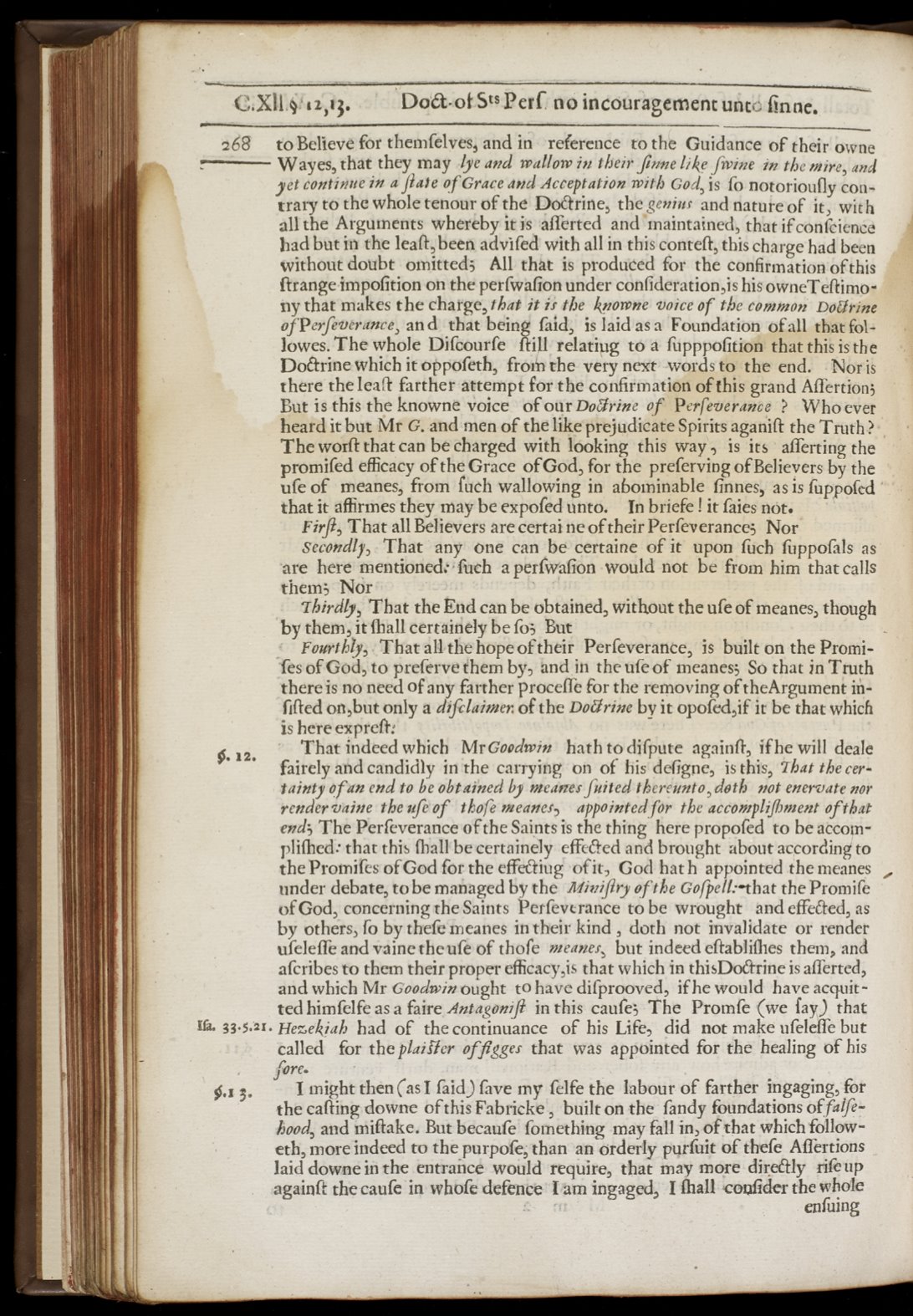

GM!
.¢'rz,i3.
Do&-ot
Sts
Perf
no
incouragement unto
finne.
268
to
Believe for themfelves,
and
in
reference
to the
Guidance
of
their
owne
r-
Wayes,
that
they may
lye
and
wallow
in their
finne
like fivine
in
the mire,
and
yet
continue
in
a
f
ate
of
Grace
and
Acceptation
with
God, is
fo
notorioufly
con-
trary to
the
whole
tenour
of
the
Dottrine, the
genius
and
nature
of
it,
wit
h
all
the
Arguments whereby
it
is
afferted
and
`maintained,
that
ifconfcience
had but
in
the
lea(l, been advifed with
all in this
conteft,
this
charge had
been
without doubt omitted;
All
that
is
produced
for the
confirmation
ofthis
ftrange impofition
on
the
perfwafion
under confideration,is
his
owneTeflimo-
ny
that
makes
the
charge,
that
it
is the
known
voice
of
the
common
Dotlrine
ofPerfeverance,
and that
being
Paid,
is
laid
as a
Foundation
ofall
that
fol-
lowes.
The
whole Difcourfe
ih
relating
to
a
fupppofition
that
this
is
the
Dottrine
which
it
oppofeth,
front
the
very
next
words
to the
end. Nor
is
there
the
leaf}
farther attempt for the
confirmation
of
this grand
Affertion;
But
is
this
the knowne
voice
of
our
Doctrine
of
Perfeverance
?
Who
ever
heard
it
but
Mr
G.
and men
of
the
like
prejudicate
Spirits
aganift
the Truth?
The
worft
that
can
becharged
with
looking this
way,
is
its
afferting the
promifed
efficacy
of
the Grace
of
God,
for
the
preferving
of
Believers by
the
ufe
of
meanes,
from
fuch
wallowing
in
abominable
finnes,
as
is
fuppofed
that
it
affirmes
they
may be expofed unto.
In briefe
!
it
faies
not.
Firft,
That
all
Believers
are certai ne
of
theirPerfeverance;
Nor
Secondly,
That
any
one
can
be certaine
of
it
upon
fuch
fuppofals
as
are
here mentioned. fuch
a perfwafion
would not be from
him
that
calls
them; Nor
Thirdly,
That
the End
can
be obtained, without the
ufe
of
meanes, though
by
them, it
(hall
certainely be fo;
But
Fourthly,
.
That
all the hope
of
their Perfeverance,
is
built on the Promi-
fes
of
God,
to
preferve them by, and
in
the
ufe
of
meanes;
So
that
in
Truth
there
is
no need
of
any
farther
proceffe for
the removing
of
theArgument
in-
fitted
on,but
only
a
difclaimer.
of the
Dotlrine by
it
opofed,if it be that
which
is
here
expreft:
4.
iz.
That
indeed
which
Mr
Goodwin
hath to
difpute againft,
if
he
will deale
fairely and candidly
in
the
carrying
on
of
his
defigne,
is
this,
That the
cer-
tainty
o
fan
end
to
be
obtained
by
wearier
failed
therennto,doth
not enervate
nor
render vaine
the
aft
of
thofe
meanes, appointed
for the
accomplifhment
ofthat
end;
The
Perfeverance of
the
Saints
is
the thing here propofed
to
be
accotn-
plifhed
: that
this
flail
be certainely
effeEted
and
brought about
according
to
the
Promifes
of
God
for
the
effeetiug
of
it,
God
hat
h
appointed
the
meanes
under debate, to
be managed
by
the
Miniftry
of
the
Gofpell:
-that
the
Promife
of
God, concerning
the
Saints
Perfevtrance to
be
wrought
and
effeEted,
as
by others,
fo
by thefe meanes
in
their
kind
,
doth not invalidate or
render
ufeleffe and vaine
the
ufe
of
thofe
meaner,
but
indeed
eftablifhes
them,
and
afcribes
to
them
their proper
efficacy,is
that
which in
thisDoltrine
is
affected,
and
which
Mr
Goodwin
ought to have difprooved,
if
he would have acquit-
ted
himfelfe
as a
faire Antagonifi in
this caufe;
The
Prornfe
(we
fay)
that
iú
33.$.21.
Hevekiah
had
of
the continuance
of
his
Life, did
not
make
ufeleffe
but
called for
theplainer
offigges
that
was
appointed for the
healing
of
his
fore.
4. 3.
I
might then (as I
Paid)
fave
my
felfe
the
labour
of
farther
ingaging, for
the
calling downe
ofthis
Fabricke
,
built
on
the
fandy foundations
of
fa
fe-
hood,
and
tuff-take.
But
becaufe fomething may
fall
in,
of
that
which follow
-
eth,
more indeed
to the
purpofe,
than
an orderly purfuit
of
thefe
Affections
laid downe
in
the
entrance would require,
that
may
more
direElly rife up
againft
the
caufe in whole defence
I am ingaged,
I (hall
confider the
whole
enfuing










